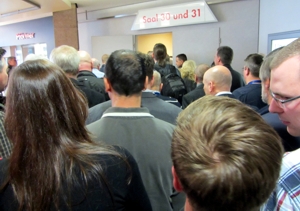At 14.00 on Thursday 20 February the Eurocido exhibition hall emptied as what seemed like virtually every visitor attempted to attend the seminar on risk mitigation measures. Despite frantic efforts by the organisers, DSV, to set up load-speakers in the lobby area outside the seminar room and to make space for as many people as possible to stand, many were disappointed.
We too found ourselves on the wrong side of the closed doors but, fortunately, we were able to catch-up with DSV chief executive, Andreas Beckmann at the end of the show, for a summary of the current situation in Germany on risk mitigation measures for second-generation anticoagulant rodenticides (SGARs).
|
One of the key take-home messages for our UK readers was that UK pest professionals should be thankful that they do not work in Germany. Strict risk mitigation measures have already been introduced for SGARs and in a prescriptive way, which forces pest controllers to manage their rodent control programmes in ways which are often unhelpful to successful control. The big concern for German pest managers, and the reason so many wanted to attend the session, is the fear that further restrictions may be imposed. In fact the changes currently emanating from Europe, which have led to the development of the Rodenticide Stewardship proposals here in the UK, are unlikely to make much difference in Germany. |
|
|
|
“It’s looking as if not much will change,” said Andreas. “In Germany access to SGARs is already restricted to expert users ie trained and qualified pest controllers. Farmers too must hold a certificate of proficiency to gain access to SGARs,” he explained. “Permanent baiting is prohibited with a maximum of four weeks of baiting allowed after which the situation must be re-evaluated. Integrated Pest Management practices must be followed and there are strict time limits – baiting sites must be revisited every five to seven days.” Andreas also told us how this is one of the prescribed measures that can be counterproductive – neophobic rats don’t like disturbing – but there are plenty more. Another example is that there is no distinction made between indoor and outdoor use of SGARs. “Those in the seminar room got very heated about these issues,” he said. In Germany, there has been no discussion between the authorities and the pest control industry about these measures and the authorities have made it clear that they do not want to talk about them. We should be thankful that the HSE here in the UK has, so far, taken a more pragmatic approach allowing the industry to develop practical risk mitigation measures. Long may that continue. |
||


